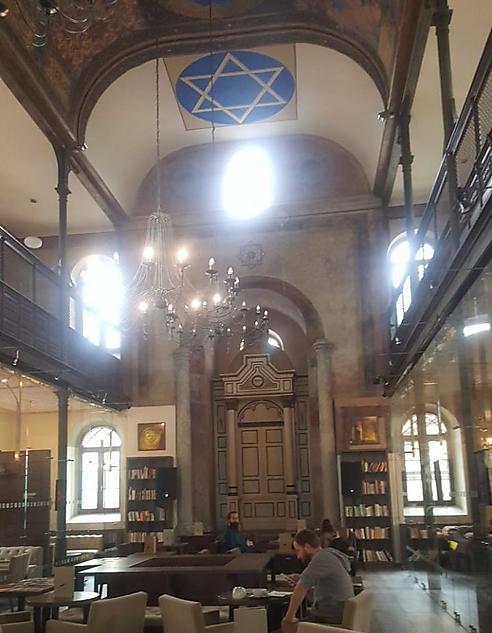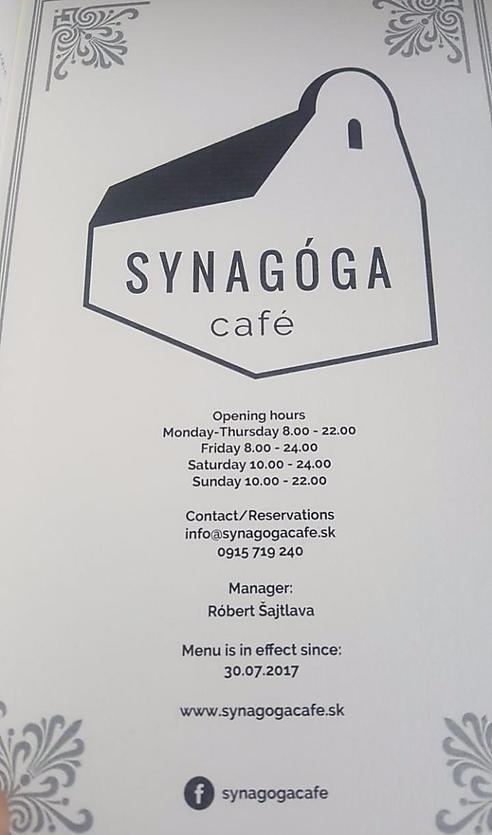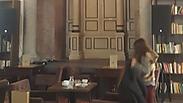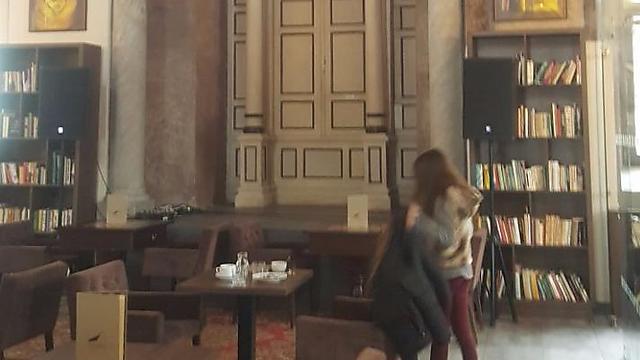
Slovak synagogue transformed into a café
No Jews remained in Trnava, Slovakia, after 80 percent of them were murdered in the Holocaust, but 2 synagogues still exist; a coffee shop was opened in one of them, boasting the name of Synagóga Café and the restoration works the proprietor carried out; Meir Davidson, an Israeli traveler who visited the café, left with mixed feelings.
Eighty-two percent of the Jews residing in Trnava, Slovakia, were murdered in the Holocaust, destroyed along with an ancient Jewish heritage dating back to the 12th century. The city's synagogues were similarly demolished—or were converted for other uses. Israeli traveler Meir Davidson found one such synagogue, converted to a café.
During his travels in Trnava—nicknamed "Slovakia's Rome" due to its proliferation of churches—Davidson found a crowded coffee shop attempting to blend into the architectural space which it occupied without totally eradicating it.
"The main street had a model of the city containing two synagogues near the local basilica," Davidson told Ynet. "We looked for them and were shocked to find an active café, filled with local yuppies."
The coffee shop's management, he added, made no effort to disguise the structure's previous designation as a house of worship and even stated it explicitly—as the café was named Synagóga Café and the "synagogue's history was printed on the menu."
'We were immensely shaken and felt mixed emotions'
The coffee shop's proprietor took pride in the fact that the structure—apparently a synagogue belonging to the Status Quo Ante denomination and built in 1897—was awarded historical preservation among 18 other religious buildings.
"I myself deal in structure preservation in Acre and their transformation into special hospitality units," Davidson said. "I got the impression there were truly amazing preservation works in place and the story of the preservation was itself interesting."
Davidson did qualify in adding, "Nothing is written about the community itself or what befell it. There's not even a monument to their memory. We were immensely shaken by the experience and felt mixed emotions."

The Israeli traveler shared his impression in a Facebook post, in which he said, "We sat in the Synagóga Café in Trnava, Slovakia, housed in a magnificent 200-year-old structure that was crumbling after its Jews had left."
"Its restoration included expansive preservation works, including of the Torah ark, ceiling murals, the location of the bimah, charity boxes, Jewish symbols and the women's section.
"The work is amazing. The restored premises were converted to a fashionable café, a cultural hotspot and concert and performance venue. The bar is excellent, as are the cakes."
Davidson, who visited last Friday, cynically added, "I have to note I haven't enjoyed the welcoming of the Sabbath in a synagogue that much for a long time. Definitely mixed feelings, as the local community didn't just up and disappear.

"It's really quite complex. An entire generation has now appeared that connotes the word 'synagogue' and Hebrew letters and symbols with pleasant experiences. The food in the café is not kosher, however, and shelves are overloaded with hundreds of books that have nothing to do with Judaism.
"One of the biggest questions in the world of preservation is whether to preserve merely the structure or its cultural values as well. I can't answer that question, but it has far-reaching implications."

















